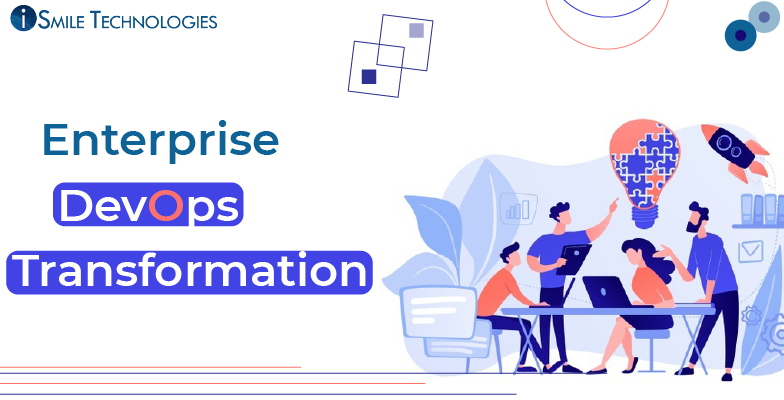DevOps is an enterprise transformation approach, and it has evolved from agile methodology. Its main idea is to break traditional laws that exist between cross-functional teams. This process integrates the developer team, QA teams and operational teams. DevOps puts products, individuals, and processes together to help organizations release high-quality software faster than traditional approaches. DevOps transformation plays a crucial role in digital transformation for today’s enterprises.
What is the meaning of enterprise DevOps transformation?
It is a process under which enterprises upgrade their organizational strategy and brings positive cultural change by applying DevOps practices and breaking traditional rules. The process of DevOps with endless combination, testing, and delivery improves business processes and ensures faster software working.
DevOps processes consist of advanced technologies like Artificial intelligence (AI), Machine Learning (ML), and Robotic Process Automation to bring enthusiasm to teams and speed up the software delivery process in the organizations DevOps transformation journey.
Ready to automate dev & ops to shorten the SDLC?
Talk to our experts today & see how they can help to fulfill your business objectives.
Here is the Seven-step approach for Enterprise DevOps Transformation
1. Plan strategically:
It is essential to prepare a DevOps transformation plan before starting the DevOps transformation process. The plan should cover all areas of the transformation journey and guide teams to move ahead in the process. It is crucial to know the aim and objectives of the transformation of an organization at this level. Winning trust from individuals is critical for the success of the DevOps transformation, as it considerably reduces the chances of resistance.
2. Establish a centre of excellence for DevOps:
DCoE is a platform where DevOps share their experiences and learn from each other. The DevOps CoE should include representatives from all delivery teams. Its head should be an enterprise leader who has support from all areas of the organization. It is crucial to have an experienced external partner conduct the starting phase of CoE. The transformation process takes a time of 12-14 months to ensure the complete transition.
3. Built a culture of learning and growth in the organization:
DevOps can change the business processes, but culture in organizations is more prone to resist the changes. A quick change can also bring some temporary strain to some parts of the business. It can transfer effectively by building a culture of inclusion, boosting the morale of teams and individuals, and ensuring collaboration between teams.
4. Set up a DevOps governing mechanism:
At this level, organizations must focus on their business processes and arrange communication channels to achieve successful DevOps transformation. Organizations must form DevOps Key Performance Indicators (KPIs) to judge the culture of the enterprise. The organizational culture needs effective governance, so we need governing principles. Governing principles or DevOps KPIs confirm safe and effective DevOps transformation.
5. Conduct workshops for teams:
This is a crucial step in the DevOps transformation journey. It is a need to conduct workshops for the teams with the help of experts to ensure the correct sizing of tools and processes. At this level, organizations should look at their existing tools and technologies to identify which tool is beneficial for them, and you can take action accordingly.
6. Using KPIs run the pilot program and compare the results:
At this stage, the DevOps team identify the proper application and domain for applying DevOps practices. The identified results should be such that they can level up the enterprise level. The correct way to execute this step is to apply the pilot projects according to the domain of the development process.
7. Collect the feedback and scale-out the DevOps program:
This is the last stage of this process. The team collects feedback from the pilot tests and scales them through multiple releases across different application portfolios. DevOps is not a one-time process; it is essential to ensure continuous feedback, optimization, and deployment throughout the journey.
Suppose you want to transform your business strategies using cloud computing. Feel free to contact us at: https://ismiletechnologies.com/request-a-consultation/. We help businesses and individuals by providing them with IT solutions.
Conclusion
Enterprise DevOps transformation has changed rapidly in the past couple of years due to automation and lean thinking. It aligns with development and operations to improve quality and value delivery. This transformation leads to the development of enterprises at a faster rate and improving their methodology and working processes.










